Thursday, August 18th 2016

AMD Demos Breakthrough Performance of the ZEN CPU Core
At an event last night in San Francisco, AMD provided additional architectural details and a first look at the performance of its next-generation, high-performance "Zen" processor core. AMD demonstrated the "Zen" core achieving a 40% generational improvement in instructions per clock, delivering a landmark increase in processor performance.
During the event, AMD demonstrated an 8-core, 16-thread "Summit Ridge" desktop processor (featuring AMD's "Zen" core) outperforming a similarly configured 8-core, 16-thread Intel "Broadwell-E" processor when running the multi-threaded Blender rendering software with both CPUs set to the same clock speed. AMD also conducted the first public demonstration of its upcoming 32-core, 64-thread "Zen"-based server processor, codenamed "Naples," in a dual processor server running the Windows Server operating system."The performance and efficiency of our 'Zen' core showcases AMD at its best," said Dr. Lisa Su, president and CEO of AMD. "Over the last four years we have made significant investments to develop a high-performance, multi-generation CPU roadmap that will power leadership products. Customer excitement for 'Zen' continues to grow as we make significant progress towards the launch of new products that will span from the datacenter to high-end PCs."
The "Zen" processor core features multiple architectural advances designed to increase the performance, throughput, and efficiency of AMD's future products. "Zen" is based on a clean-sheet design and features a new cache hierarchy, improved branch prediction and simultaneous multithreading (SMT). These advances will allow the "Zen" core to scale to meet the needs of a broad range of applications, including fanless 2-in-1s, embedded systems, high-performance computing, and the datacenter."An engineer may get one chance in their career to work on a project of this size and scope, and maybe never one with as much potential to impact the future as much as 'Zen,'" said Mark Papermaster, senior vice president and chief technology officer at AMD. "With 'Zen' we aim to do what many never thought possible - deliver a 40 percent generational improvement in instructions per clock while maintaining power requirements in line with our previous generation technology."
"AMD invested where it counts, with an x86 core that can scale from PCs to high-performance servers," said Linley Gwennap, principal analyst, Linley Group. "Consumers today expect to get the most out of their systems to create transformative experiences. The versatile design of 'Zen' delivers highly-efficient performance that should provide increased computing capabilities across the spectrum - from devices to cloud computing."Expected to launch first, the "Zen"-based "Summit Ridge" desktops will utilize the AMD AM4 socket, a new unified socket infrastructure that is compatible with 7th Generation AMD A-Series desktop processors - previously codenamed "Bristol Ridge" - for exceptional performance and connectivity scalability required by AMD partners and customers. The first desktop systems featuring 7th Generation AMD A-Series processors and new AM4 sockets are scheduled to ship in the second half of 2016 in OEM PC designs.
With dedicated PCIe lanes for cutting-edge USB, graphics, data and other I/O, the AMD AM4 platform will not steal lanes from other devices and components. This allows users to enjoy systems with improved responsiveness and benefit from future-ready technologies that the AM4 platform provides with a powerful, scalable and reliable computing solution.
AMD AM4 platform key technology features include:
During the event, AMD demonstrated an 8-core, 16-thread "Summit Ridge" desktop processor (featuring AMD's "Zen" core) outperforming a similarly configured 8-core, 16-thread Intel "Broadwell-E" processor when running the multi-threaded Blender rendering software with both CPUs set to the same clock speed. AMD also conducted the first public demonstration of its upcoming 32-core, 64-thread "Zen"-based server processor, codenamed "Naples," in a dual processor server running the Windows Server operating system."The performance and efficiency of our 'Zen' core showcases AMD at its best," said Dr. Lisa Su, president and CEO of AMD. "Over the last four years we have made significant investments to develop a high-performance, multi-generation CPU roadmap that will power leadership products. Customer excitement for 'Zen' continues to grow as we make significant progress towards the launch of new products that will span from the datacenter to high-end PCs."
The "Zen" processor core features multiple architectural advances designed to increase the performance, throughput, and efficiency of AMD's future products. "Zen" is based on a clean-sheet design and features a new cache hierarchy, improved branch prediction and simultaneous multithreading (SMT). These advances will allow the "Zen" core to scale to meet the needs of a broad range of applications, including fanless 2-in-1s, embedded systems, high-performance computing, and the datacenter."An engineer may get one chance in their career to work on a project of this size and scope, and maybe never one with as much potential to impact the future as much as 'Zen,'" said Mark Papermaster, senior vice president and chief technology officer at AMD. "With 'Zen' we aim to do what many never thought possible - deliver a 40 percent generational improvement in instructions per clock while maintaining power requirements in line with our previous generation technology."
"AMD invested where it counts, with an x86 core that can scale from PCs to high-performance servers," said Linley Gwennap, principal analyst, Linley Group. "Consumers today expect to get the most out of their systems to create transformative experiences. The versatile design of 'Zen' delivers highly-efficient performance that should provide increased computing capabilities across the spectrum - from devices to cloud computing."Expected to launch first, the "Zen"-based "Summit Ridge" desktops will utilize the AMD AM4 socket, a new unified socket infrastructure that is compatible with 7th Generation AMD A-Series desktop processors - previously codenamed "Bristol Ridge" - for exceptional performance and connectivity scalability required by AMD partners and customers. The first desktop systems featuring 7th Generation AMD A-Series processors and new AM4 sockets are scheduled to ship in the second half of 2016 in OEM PC designs.
With dedicated PCIe lanes for cutting-edge USB, graphics, data and other I/O, the AMD AM4 platform will not steal lanes from other devices and components. This allows users to enjoy systems with improved responsiveness and benefit from future-ready technologies that the AM4 platform provides with a powerful, scalable and reliable computing solution.
AMD AM4 platform key technology features include:
- DDR4 Memory
- PCIe Gen 3
- USB 3.1 Gen2 10Gbps
- NVMe
- SATA Express
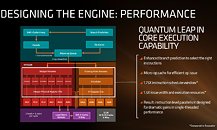
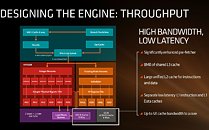
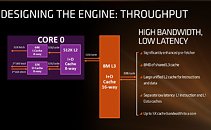
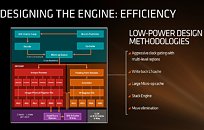
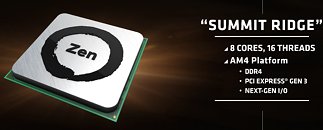
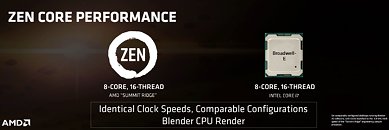
187 Comments on AMD Demos Breakthrough Performance of the ZEN CPU Core
AMD IS BACK BABY!
There was an asterix with this, since they matched the frequency which meant downclocking the Intel.
The most worrying thing is the lack of numbers for single-threaded performance, which still is the biggest part for general computing.
Much of the rumor mill has been spewing out signs that would suggest the same, which would fit the alledged current state of Globalfoundries' 14nm process (if they are building Zen at GF at all, some rumors also suggest AMD using TSMC for Zen instead).
I hope AMD does well with Zen but I'm waiting on the reviews as well.
Queue the haters...3.2.1
Again, cool down the hype.
Im all down for buying high-end Zen if it performs similarly, but I really doubt it.
Bottom point is is that AMD actually offers something with raw power that COMPETES with intel's 8c/16t CPU worth 1000$.
I've been waiting to dam long for this and been with Intel for a while and really.... gawd I hope they pull this off!!
Edit @Jism don't say ( you ppl ) there isn't a can of troll spry big enough to ease there FH's ;)
Why would they use anything but the multiplier? How do you know this won't be just as expensive or just barely cheaper?
What we do know though, like going to a 128-bit FPU instead of Intels 256-bit is quite the compromise. This will lower performance in certain applications.
Again don't hype this up just yet, there are too many unknowns for this.
What if it doesn't?
Processor base frequency is 3.2, so they didn't have to down clock it much, and turning off turbo boost stops it from reaching its max of 4GHz.
I hope this is true, and await some more reviews of the chips. I hope as well that they are using TSMC or someone else to make the performance Zen cores for the obvious performance and power benefits , but perhaps GloFlo will be able to make them cheaper so instead of paying through the nose for a chip with low yields and limited availability, we can have a good old fashioned price war again.www.newegg.com/Product/Product.aspx?Item=N82E16819117645
Um, no. Intel 140W at 3.2Ghz with 3.7 boost on a over $10000 chip.
Would I take a chip that can only reach 3.0Ghz at 140W out of the box for $500? All day long.